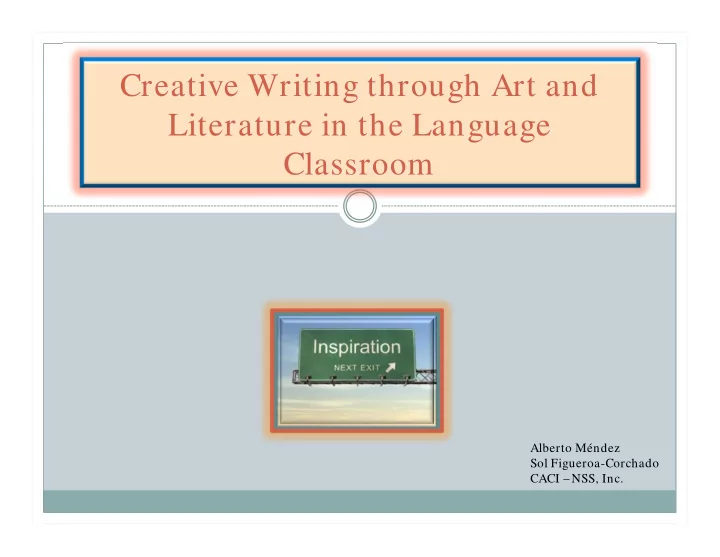

Creative Writing through Art and Literature in the Language Classroom Alberto Méndez Sol Figueroa-Corchado CACI –NSS, Inc.
What is Creative Writing?
Creative Writing … is any writing that goes outside the bounds of normal professional, journalistic, academic, or technical forms of literature, typically identified by an emphasis on narrative craft, character development, and the use of literary tropes or with various traditions of poetry and poetics.
“Everyone has a different story, and you have to ask yourself what m otivates people to see reality the way they do.” -Cathy Holton
What is the best approach in teaching students how to write? Desire to write. (purpose to write) Interest in Topic Arranging ideas - Brainstorming – Rhetorical structure between languages – (organizational structure) Form- idiomatic expressions, tone, colloquialisms and/ or language manipulation) Polish - revision (grammar structure – sentence structure – syntax, vocabulary usage) Editing (pre-editing, peer review, teacher’s feedback) – support/ guide
How does a student becom e a better writer? Can we m ake better writers? How do we m ake better writers?
Why have foreign language teachers been reluctant to use writing activities in the classroom or to integrate writing into the curriculum ?
Reference Page https:/ / www.google.com/ search?q=creative+writing%3F&tbm=nws&source=lnms&sa=X&ved=0ahU KEwiZnb7S_5DVAhVK74MKHT1TBdAQ_AUIBigB&biw=1920&bih=986&dpr=1#q=creative+writing ?&spf=1500317884555 http:/ / www.goodreads.com/ quotes/ 451509-everyone-has-a-different-story-and-you-have-to-ask https:/ / austinkleon.com/ 2009/ 06/ 24/ how/ http:/ / vocalability.com/ technology-and-the-reluctant-voice-teacher/
Creative Writing through Art and Literature in the Language Classroom Gabriel García Márquez Lesson Plan: Literature
Gabriel García Márquez 6 March 1927 – 17 April 2014. Born in Aracataca, Colombia. Colombian novelist, short-story writer, screenwriter and journalist. Considered one of the most significant authors of the 20th century and one of the best in the Spanish language. Nobel Prize for Literature in 1982.
Un día de estos
Un día de estos " Uno de estos días - One of these days" belongs to the storybook "Los funerales de la mama grande", published in 1962. It belongs to the literary genre narrative, since it relates a fictitious event or event that develops in time, in which the author's feelings are left out. As for the sub-genre, the work is a short story, since it is a short story consisting of few characters and a simple event or event. The internal structure of this story is composed of three moments; The presentation , which is the presentation of the dentist and his work, developm ent , which includes the dialogue between the dentist and his son and the mayor's entrance and extraction of molar, and the outcome, which is the farewell between the mayor and the dentist. The story is told by an external narrator, omniscient, narrates in third person, is distant and contained, because it does not stop to comment on the facts.
Lesson Plan Lesson Plan: To creatively write a short story by using illustrations (literature) and/ or art (paintings) in the language classroom. Lesson Objective: The student will be able to creatively write a short story by observing an illustration provided by the teacher. (not a descriptive exercise) The students will be able to recognize the specific cultural differences and idiosyncrasies in the vocabulary pertaining to these domains; as well as the differences between the urban vs. the rural registries of different countries. Identify characteristics and qualities about specific characters in the story and explore the character’s process and its fate. Prepare for and participate effectively in a range of conversations and collaborations with diverse partners, building on others’ ideas an expressing their own clearly and persuasively. Integrate and evaluate information presented in diverse media and formats, including visually, quantitatively, and orally. Evaluate a speaker’s point of view, reasoning and use of evidence and rhetoric. Materials: Lesson plan Painting/ illustration Index cards (brainstorming) Vocabulary list/ phrases Short story (teacher) – literature Painting (teacher) - art
Francisco Oller y Cesteros Lesson Plan: Art
Francisco Oller Francisco Oller (1833–1917) was among the most celebrated painters to emerge from the Caribbean in the nineteenth century. His talents were evident when he was a young artist in San Juan, Puerto Rico, and they were further developed during four sojourns in Europe. There, he absorbed and reconfigured the radical styles of Realism, with its democratic approach to everyday subject matter, and Impressionism, with its emphasis on the sensation of spontaneous and momentary effects of light and atmosphere. Together, these movements helped Oller form a unique artistic vision of his native Puerto Rico.
The Painting This work of art presents the wake of a dead person, especially the one of a child, a “baquiné”; where you see people enjoying themselves while the parents weep and suffer the loss of their son. Oller through his work presents the social problems of the island and the concept of death in the culture. “The Wake” is listed in impressionistic and realistic style. “The Wake” is considered an example of mastery in the art of color combination. It is a study of different types of Puerto Ricans; in this case presented by the wake of a child or baquiné, this type of celebration occurred mainly in the fields.
El velorio: The Wake
References https:/ / www.google.com/ search?q=un+d%C3%ADa+de+estos&source=lnms&tbm=isch&sa=X &ved=0ahUKEwjPioCOiP_UAhWBzIMKHc4ODQQQ_AUICigB&biw=1920&bih=986#tbm=isc h&q=un+d%C3%ADa+de+estos+gabriel+garc%C3%ADa+m%C3%A1rquez&imgrc=5Zh6QZESI 6QsbM:&spf=1499701846118 https:/ / cualestuexperiencia.wordpress.com/ 2014/ 08/ 05/ analisis-un-dia-de-estos-de-gabriel- garcia-marquez/ http:/ / ciudadseva.com/ texto/ un-dia-de-estos/ http:/ / www.classicshorts.com/ stories/ ootdays.html https:/ / www.google.com/ search?q=un+d%C3%ADa+de+estos&source=lnms&tbm=isch&sa=X &ved=0ahUKEwjPioCOiP_UAhWBzIMKHc4ODQQQ_AUICigB&biw=1920&bih=986#tbm=isc h&q=un+d%C3%ADa+de+estos+gabriel+garc%C3%ADa+m%C3%A1rquez&imgrc=5Zh6QZESI 6QsbM:&spf=1499701846118 http:/ / www.mapr.org/ en/ visit/ calendar/ impressionism-and-caribbean-francisco-oller-and- his-transatlantic-world https:/ / www.bing.com/ images/ search?view=detailV2&ccid=EDllMMqy&id=D5BCAB81968BA C62BC6BFBB8F298CA698E23A03D&thid=OIP.EDllMMqyu95U_bpiAMr37wEYEs&q=creativ e+Writing+Question+Marks&simid=608031061356383163&selectedindex=135&mode=overlay &first=1
Questions?
Recommend
More recommend